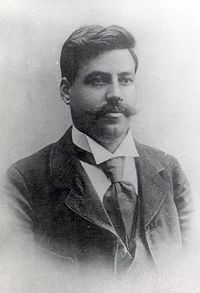Gotse Delchev
Georgi Nikolov Delchev (Bulgarian/Macedonian: Георги/Ѓорѓи Николов Делчев, known as Gotse Delchev, also spelled Goce Delčev, Cyrillic: Гоце Делчев, originally spelled in older Bulgarian orthography: Гоце Дѣлчевъ; 1872–1903) was an important revolutionary figure in Ottoman-ruled Macedonia and Thrace at the turn of the 20th century. He was one of the leaders of what is known today as Internal Macedonian Revolutionary Organization (IMRO), a paramilitary organization active in the Ottoman territories in Europe at the end of the 19th and the beginning of the 20th century.Born in Kukush, then in the Ottoman Empire, in his youth he was inspired by the ideals of revolutionaries as Vasil Levski and Hristo Botev, who envisioned the creation of Bulgarian republic of ethnic and religious equality, as part of an imagined Balkan Federation. Delchev graduated secondary education in Thessaloniki's Bulgarian male high school and entered the Military School of His Princely Highness in Sofia, but he had been dismissed from there, because of his leftist political persuasions. Then he returned as Bulgarian teacher to Ottoman Macedonia, to became immediately an activist of the newly found revolutionary movement in 1894.Although, considering himself to be an inheritor of the Bulgarian revolutionary traditions, as committed republican Delchev was disillusioned by the reality in the post-liberation Bulgarian monarchy. Also by him, as by many Macedonian Bulgarians, originating from an area with mixed population, the idea of being ‘Macedonian’ acquired the importance of a certain native loyalty, that constructed a specific spirit of local patriotism and multi-ethnic regionalism. He maintained the slogan promoted by William Gladstone, "Macedonia for the Macedonians", consisting from all different nationalities, inhabiting the area. In this way, his outlook included a wide range of such disparate ideas as Bulgarian patriotism, Macedonian regionalism, anti-nationalism and incipient socialism.As result, his political agenda became the establishment through revolution of an autonomous Macedono-Adrianopolitan supranational state into the framework of the Ottoman Empire, as a prelude to its incorporation within a future Balkan Federation. He revised the Organization's program, emphasizing the importance of cooperation among all ethnic groups in the territories concerned in order to obtain political autonomy. Delchev also lunched the establishment of a secret revolutionary network, that would prepare the population for an armed uprising against the Ottoman rule. However, he opposed the IMRO Central Committee’s plan for a mass uprising in the Summer of 1903, favoring terrorist and guerilla tactics. Nevertheless, he was killed by an Ottoman unit in May, thus the liberation movement lost its most important organizer, at the eve of the Ilinden-Preobrazhenie Uprising.Today Gotse Delchev is considered as a national hero in Bulgaria, as well as in the Republic of Macedonia, where it is claimed that he was among the founders of the Macedonian national movement. Despite such Macedonian historical interpretations, Delchev had Bulgarian national identity and viewed his compatriots as Bulgarians. The designation Macedonian according to the then used ethnic terminology included Albanians, Bulgarians, Greeks, Turks, Vlachs and Serbs, and when applied to the local Slavs, it meant a regional Bulgarian identity. However, contrary to the Bulgarian assertions, his autonomist ideas of a separate Macedonian (and Adrianopolitan) political entity, have stimulated the development of the contemporary Macedonian nationalism.
Personal facts

| Birth date | February 04, 1872 |
|---|---|
| Birth place | |
| Ethnicity | |
| Religion | |
| Date of death | May 04, 1903 |
| Place of death |